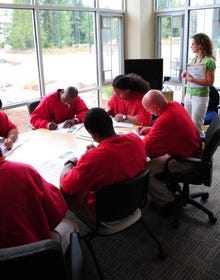Workforce Development
The Workforce Development (WD) team provides meaningful community partnerships and learning opportunities for Correctional Industries (CI) workers so they can successfully reintegrate into society and rapidly engage with employment, training or education. The WD team aims to support three objectives. The first is to ensure every qualified CI participants is "work ready" and employable upon release. The second is to achieve post release employment as part of a unified employment plan developed by the program specialists in collaboration with the participants. Our final objective is to develop partnerships with community providers on job readiness, job placement, and training and education. Rapid attainment of gainful employment can help releasing men and women achieve success upon release. CI staff and supervisors act as role models and teach incarcerated individuals technical skills through on the job training, and also act as role models that workers can learn from through interaction and observation - reinforcing positive work habits and behavior prior to release.
Classes & Training
Correctional Industries offers a variety of classes and trainings depending on the institution and amount of time the incarcerated individual has before release. CI has also developed a strong relationship with the Department's education program which contracts with the State Board for Community and Technical Colleges. CI and Education work together to link industry jobs with instructional programs such as baking, Computer Numerical Control (CNC) for the workplace, technical design, upholstery and welding. Incarcerated individuals trained through CI's Trade Related Apprenticeship Coaching (TRAC) program, or by working with various organizations, can connect with union apprenticeship programs and earn specialized industry accredited certificates.
A Skilled Workforce
From classroom training to on-the-job training, participants learn skills ranging from basic social skills to highly technical computer skills. CI workers are not only technically trained, but also trained in employment based soft skills, like solving problems logically, handling difficult situations and working together toward a common goal.
Soft Skills
- Responsibility
- Critical thinking
- Problem solving / Adaptability
- Good communication
- Teamwork
- Accepting feedback
- Positive work ethic
Technical Skills
- Accounting & Data Entry
- Assembly & Production
- Baking & Food Service
- Carpentry & Drafting
- Fabrication & Welding
- Sewing & Upholstery
- Paint and Powder Coating
Community Employment Services


Correctional Industries provides on-the-job and essential skill training opportunities in a true work environment. In support of CI's mission, Community Employment Services (CES) specialists work with incarcerated individuals pre- and post-release to fine tune and document their work experience and skills in preparation for gainful employment. CES specialists then link these skilled workers with employers and businesses in the community, matching their skills, abilities and experience with employers. Specialists are uniquely positioned to connect employers with qualified workers in a wide range of technically skilled or entry level positions. Additionally, community employment specialists will remain in contact with and provide continuous support to each participant for up to one year after release.
Partnering Opportunities
As an employer in Washington State, you qualify for placement services. We offer no-cost hiring solutions to King, Pierce and Thurston County employers by matching motivated skilled candidates who meet the qualifications you are seeking. We are personally vested in meeting your employment needs. Chances are, we have a candidate who can meet your staffing needs with technical, interpersonal and transferable skills that will fit into your workforce. Discover how you can put CI Community Employment Services to work for you. Contact us and set up an appointment with one of our CES specialists.




Soft Skills
To enhance “soft” or interpersonal skills, CI offers a special 20-hour class called “Makin’ It Work.” The class is designed to incarcerated individuals understand what employers are looking for. Participants develop the necessary thinking and positive behavior that helps ensure success while working for CI, as well as success in transitioning into the community. Modules include Thinking Straight, Keeping Self-Control, Solving Problems Logically and Handling Difficult Situations. While we have noticed that some participants already have some of these skills, their presence in the classrooms provides peer role models to others in need of refinement and application.


Roots of Success
This environmental literacy curriculum introduces incarcerated individuals to the green economy and an understanding of environmental sustainability. It aims to help participants become more successful academically, and create an awarness of the importance of green jobs in the economy.


Mock Interviews
Mock interview fairs bring employers and community partners inside prison walls to help incarcerated individuals practice their interviewing skills. It is our goal to organize and conduct regular mock interview fairs and experiences at designated institutions. These events provide a realistic job application and interview experience to participants who will release into the job market in the near future. It also presents a potential workforce to outside employers and represents the positive things individuals can do while they are incarcerated to prepare for work once they release.
